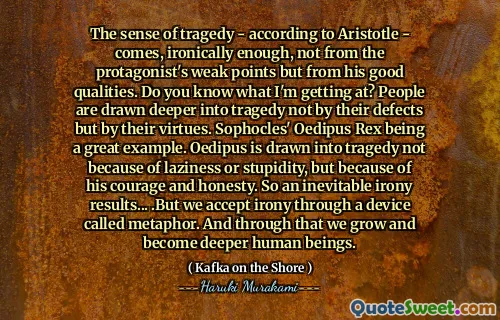You sit at the edge of the world,I am in a crater that's no more.Words without lettersStanding in the shadow of the door.The moon shines down on a sleeping lizard,Little fish rain from the sky.Outside the window there are soldiers,steeling themselves to die.{Refrain}Kafka sits in a chair by the shore,Thinking for the pendulum that moves the world, it seems.When your heart is closed,The shadow of the unmoving Sphinx,Becomes a knife that pierces your dreams.The drowning girl's fingersSearch for the entrance stone, and more.Lifting the hem of her azure dress,She gazes --at Kafka on the shore
The passage evokes a surreal landscape where the boundaries between reality and dreams blur. The imagery illustrates a contrast between serene elements, like the moon and a sleeping lizard, and harsh realities, such as soldiers preparing for death. This juxtaposition reflects the complexity of human existence and the struggle between hope and despair. The mention of Kafka suggests a philosophical pondering on the nature of life and the weight of decisions that shape our paths.
As the drowning girl seeks solace and understanding, her actions symbolize the quest for clarity amidst chaos. Kafka's presence serves as a reminder of introspection and the deep questions that consume us. The dreamlike quality of the scene invites reflection on the significance of our emotions and aspirations while confronting the inevitable challenges life presents. This narrative encourages readers to explore their own dreams and fears against a backdrop of poignant imagery.






